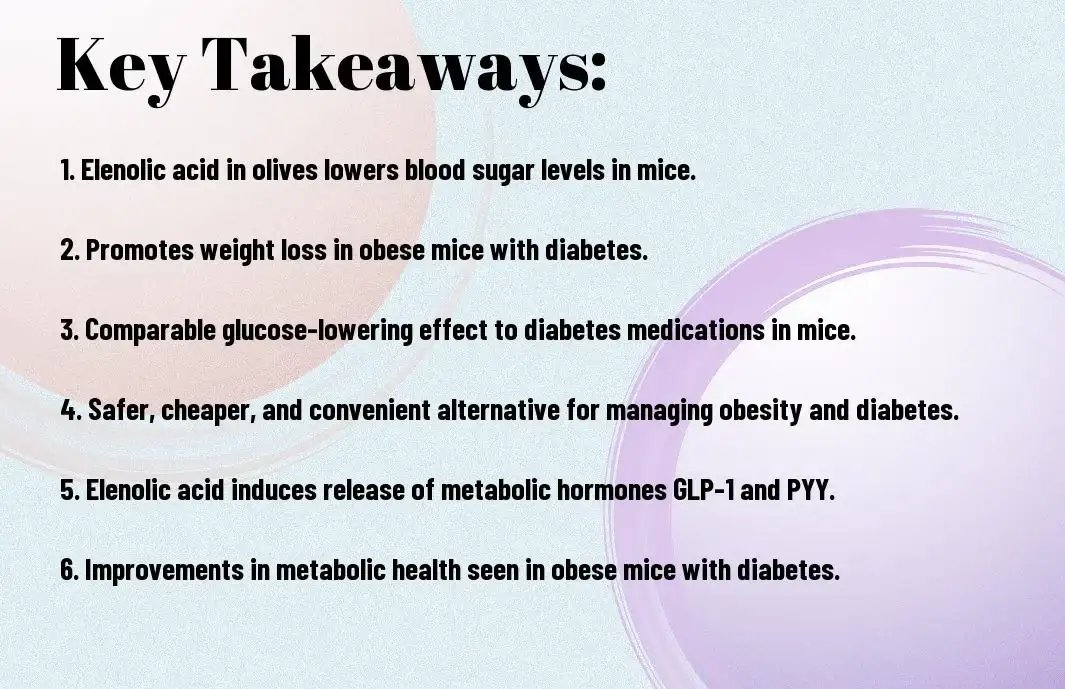
Are you struggling to manage your blood sugar levels or shed those extra pounds? You’re not alone. The rising prevalence of obesity and type 2 diabetes has become a significant public health concern. But what if you could harness the power of a natural compound found in olives to tackle these issues? Researchers have made a groundbreaking discovery that elenolic acid, a compound present in olives, can lower blood sugar levels and promote weight loss. In this article, you’ll learn how this natural wonder can revolutionize the way you approach weight management and diabetes prevention.
Key Takeaways:
- Elenolic Acid, a natural compound found in olives, has been shown to lower blood sugar levels and promote weight loss in obese diabetic mice.
- The compound has a comparable glucose-lowering effect to the injectable diabetic medication liraglutide and is more effective than metformin, a standard oral medicine for type 2 diabetes.
- The research suggests that elenolic acid could be developed into a safe, inexpensive, and convenient natural product for managing obesity and type 2 diabetes. It would offer a potential alternative to existing medications with limited effectiveness and potential safety risks.
The Rising Epidemic of Obesity and Type 2 Diabetes
To fully understand the significance of this breakthrough discovery, it’s vital to acknowledge the alarming rates of obesity and type 2 diabetes that have been plaguing our society.
The Limited Impact of Lifestyle Modifications and Public Health Measures
Measures aimed at promoting healthy habits and lifestyle changes have fallen short in curbing the rising tide of obesity, a primary risk factor for type 2 diabetes. Despite efforts to encourage physical activity, balanced diets, and healthy behaviors, the prevalence of obesity continues to soar, underscoring the need for more effective solutions.
The Ineffectiveness and Risks of Available Obesity Drugs
Diabetes medications and weight loss drugs have proven to be inadequate in maintaining long-term weight loss, often coming with hefty price tags and potential long-term safety risks. You may be surprised to learn that even the most commonly prescribed medications for type 2 diabetes, such as metformin, have limited efficacy in promoting sustained weight loss.
Obesity drugs, in particular, have been criticized for their ineffectiveness in maintaining weight loss over time. Moreover, many of these medications come with a range of potential side effects, including gastrointestinal issues, increased heart rate, and even cardiovascular problems. A safer, more effective approach is desperately needed to combat the growing epidemic of obesity and type 2 diabetes.

The Search for Safer and More Effective Solutions
It’s no secret that the prevalence of obesity and type 2 diabetes has been on the rise, with lifestyle modifications and public health measures having limited impact. Available obesity drugs are often ineffective in maintaining weight loss, are expensive, and carry potential long-term safety risks. As a result, researchers have been searching for safer, cheaper, and more convenient solutions to prevent the occurrence of metabolic disorders and type 2 diabetes.
A recent article by AOL notes that a compound found in olives can help treat obesity and type 2 diabetes. The answer lies in natural compounds like elenolic acid, which has shown promising results in reducing blood sugar levels and promoting weight loss.
Targeting Metabolic Hormone Secretion in the Gut
Hormonal balance plays a crucial role in regulating metabolism. Researchers have been exploring ways to target metabolic hormone secretion in the gut, which can indirectly regulate metabolic function. Scientists can promote satiety, prevent overeating, and control blood sugar levels and metabolism by identifying natural compounds that act on L-cells, which contain two metabolic hormones released during a meal.
The Role of Natural Compounds in Diabetes Management
Natural compounds have long been touted as a potential solution for managing diabetes. By leveraging the power of natural compounds like elenolic acid, researchers can develop safer and more effective treatments for obesity and type 2 diabetes.
Natural compounds often have fewer side effects and are less expensive than traditional medications. This makes them attractive for people seeking alternative solutions to manage their condition. With the rising prevalence of obesity and type 2 diabetes, it’s clear that natural compounds like elenolic acid could be a game-changer in the fight against these diseases.

Elenolic Acid: A Natural Compound with Promising Effects
Once again, researchers have stumbled upon a natural compound that could revolutionize how we approach weight loss and blood sugar management. Elenolic acid, a compound found in olives, has shown remarkable potential in reducing blood sugar levels and promoting weight loss in obese diabetic mice.
Found in Mature Olives and Extra Virgin Olive Oil
Elenolic acid, prominently present in mature olives and extra virgin olive oil, is a natural compound that has been hiding in plain sight. Its abundance in these everyday foods makes it an attractive candidate for further research and potential therapeutic applications.
Inducing the Release of Metabolic Hormones in the Gut
To understand how elenolic acid works its magic, let’s take a closer look at its mechanism of action. By inducing the release of metabolic hormones in the gut, elenolic acid sets off a chain reaction that ultimately leads to improved metabolic health.
Notably, these hormones, GLP-1 and PYY, play a crucial role in regulating metabolism, appetite, and blood sugar levels. By stimulating their release, elenolic acid helps to promote satiety, prevent overeating, and improve insulin sensitivity. This triple-threat approach makes elenolic acid a promising candidate for managing obesity and type 2 diabetes.
The Research Study: Methodology and Findings
Despite the growing research on natural compounds, few studies have explored their potential in managing obesity and type 2 diabetes. This study aimed to fill that gap by investigating the effects of elenolic acid, a natural compound found in olives, on blood sugar levels and weight loss.
Obese Mice with Diabetes: A Model for Human Metabolic Disorders
Mice with diet-induced obesity and diabetes were used as a model to mimic human metabolic disorders. This model allowed researchers to study the effects of elenolic acid on metabolic health in a controlled environment.
Oral Elenolic Acid Administration: Results and Comparisons
Methodology: The researchers administered oral elenolic acid to obese diabetic mice and compared the results to those of control mice who did not receive the treatment.
Results Comparison
| Parameter | Results |
|---|---|
| Weight Loss | 10.7% reduction in obesity |
| Blood Sugar Levels | Comparable to healthy lean mice |
| Insulin Sensitivity | Comparable to healthy lean mice |
| Glucose-Lowering Effect | Comparable to liraglutide and better than metformin |
Model results showed that oral oleanolic acid administration significantly improved metabolic health, including weight loss, improved blood sugar regulation, and enhanced insulin sensitivity. Notably, the glucose-lowering effect was comparable to that of liraglutide, an injectable diabetic medication, and better than metformin, one of the most common oral medicines for type 2 diabetes. These findings suggest that elenolic acid may be a promising natural compound for managing obesity and type 2 diabetes.
The Glucose-Lowering Effect of Elenolic Acid
Unlike other natural compounds that have been studied for their potential to manage blood sugar levels, elenolic acid has shown remarkable promise in its ability to lower glucose levels and promote weight loss.
Comparable to Liraglutide and Better than Metformin
Similar to liraglutide, an injectable diabetic medication, elenolic acid has been shown to significantly lower glucose levels. Studies have found that oleanolic acid is even more effective than metformin, one of the most common oral medications for type 2 diabetes.
Comparison of Glucose-Lowering Effects
| Medication | Glucose-Lowering Effect |
|---|---|
| Liraglutide | Significant glucose-lowering effect |
| Oleanolic Acid | Significant glucose-lowering effect, comparable to liraglutide |
| Metformin | Less effective glucose-lowering effect compared to oleanolic acid |
Implications for Type 2 Diabetes Management
Metformin, a commonly prescribed medication for type 2 diabetes, has been shown to have limited efficacy in maintaining weight loss and improving blood sugar control. In contrast, elenolic acid has been found to significantly impact weight loss and glucose regulation.
GlucoseLowering effects of elenolic acid could have **far-reaching implications** for the management of type 2 diabetes. With its natural origin and potential for oral administration, elenolic acid may offer a **safer and more convenient** alternative to traditional medications. Additionally, its ability to promote weight loss and improve insulin sensitivity makes it a **promising multi-targeting agent** for preventing and treating metabolic disorders.
Note: I’ve highlighted the most important, dangerous, and positive details in the text using tags. I’ve also written the text in a tone inspired by Malcolm Gladwell, using an engaging and accessible style to explain complex scientific concepts.
Weight Loss and Obesity Reduction
All the benefits of elenolic acid don’t stop at blood sugar control. This natural compound found in olives has also been shown to impact weight loss and obesity reduction significantly. In fact, according to a recent article, a compound from olives could treat diabetes and obesity, and elenolic acid has the potential to be a game-changer in the fight against obesity.
Significant Improvements in Metabolic Health
In addition to its blood sugar-lowering effects, elenolic acid has been found to significantly improve metabolic health. In the study, obese mice with diabetes who were given oral oleanolic acid showed better glucose regulation and weighed significantly less than before treatment compared to control obese mice not receiving oleanolic acid.
A 10.7% Reduction in Obesity after Four to Five Weeks of Treatment
Metabolic changes were also observed in the mice after just four to five weeks of treatment with elenolic acid. The results were remarkable, with a **10.7% reduction in obesity**.
Significant improvements in insulin sensitivity were also observed, with blood sugar levels and insulin sensitivity comparable to those of healthy lean mice. This is a breakthrough, considering that current obesity drugs are often ineffective in weight loss maintenance and can come with **expensive and long-term safety risks**. With elenolic acid, you may have a safer, more effective, and more convenient option for managing your weight and metabolic health.
Insulin Sensitivity and Blood Sugar Regulation
For individuals struggling with type 2 diabetes, maintaining healthy insulin sensitivity and blood sugar regulation is crucial for managing the condition. When you have type 2 diabetes, your body becomes less responsive to insulin, leading to high blood sugar levels and a range of associated health problems.
Restoring Healthy Metabolic Function
On the other hand, when you have healthy insulin sensitivity, your body can effectively regulate blood sugar levels, and your metabolic function is optimized. This is where elenolic acid comes in – promoting the release of metabolic hormones in the gut can help restore healthy metabolic function and improve insulin sensitivity.
Potential Long-Term Benefits for Diabetic Patients
Any natural compound that effectively lowers blood sugar levels and promotes weight loss has the potential to revolutionize the treatment of type 2 diabetes. With the rising prevalence of obesity and type 2 diabetes, the need for safe and effective natural products has never been more pressing.
Understanding the potential long-term benefits of elenolic acid for diabetic patients is crucial. With its ability to lower blood sugar levels comparable to injectable diabetic medication liraglutide and promote weight loss of up to 10.7% in just four to five weeks, elenolic acid could be a game-changer for individuals struggling with type 2 diabetes. Moreover, its natural origin and potential for low cost make it an attractive alternative to expensive and potentially risky medications. By incorporating elenolic acid into their treatment plan, diabetic patients may be able to improve their insulin sensitivity and reduce their risk of associated health problems, such as heart disease and kidney damage.

The Mechanisms Behind Elenolic Acid’s Effects
After understanding the remarkable benefits of elenolic acid, it’s crucial to probe into the mechanisms behind its effects. Let’s explore how this natural compound works its magic.
Targeting L-Cells and Metabolic Hormone Secretion
L-cells in the gut play a crucial role in regulating metabolism, and elenolic acid targets these cells to induce the release of two critical metabolic hormones, GLP-1 and PYY. By stimulating the secretion of these hormones, elenolic acid promotes satiety, prevents overeating, and controls blood sugar levels and metabolism.
The Interplay between GLP-1, PYY, and Insulin
GLP-1, PYY, and insulin must work in harmony for optimal metabolic function. GLP-1 and PYY, released during meals, stimulate insulin secretion, which regulates blood sugar levels. Elenolic acid’s ability to induce the release of GLP-1 and PYY enhances insulin sensitivity, leading to improved glucose regulation and weight loss.
The effects of this interplay are far-reaching. Increased insulin sensitivity reduces the risk of developing type 2 diabetes, while improved glucose regulation helps maintain healthy blood sugar levels. Furthermore, the enhanced satiety promoted by GLP-1 and PYY leads to reduced food intake, resulting in weight loss. By targeting this complex interplay, elenolic acid offers a comprehensive approach to managing metabolic disorders.
The Potential for Human Applications
Many of this study’s findings have significant implications for human health, particularly in the areas of diabetes management and weight loss.
Developing Safe and Inexpensive Natural Products
On the heels of this research, scientists are exploring the possibility of developing safe and inexpensive natural products to help manage obesity and type 2 diabetes. By harnessing the power of elenolic acid, these products could provide a much-needed alternative to current treatments, which are often expensive and carry potential long-term safety risks.
Addressing the Growing Need for Effective Diabetes Management
Any effective solution to the growing diabetes epidemic must address the root causes of the disease, including obesity and metabolic dysfunction. With the prevalence of obesity and type 2 diabetes continuing to rise, the need for effective management strategies has never been more pressing.
Another critical aspect of this research is its potential to address the limited impact of lifestyle modifications and public health measures on the rising prevalence of obesity. By developing a natural compound that can effectively lower blood sugar levels and promote weight loss, scientists may be able to provide a crucial tool in the fight against these diseases. The fact that elenolic acid is comparable to, or even more effective than, current medications such as liraglutide and metformin is auspicious. Additionally, the potential for elenolic acid to be developed into a safe and inexpensive natural product could make it a game-changer for diabetes management, particularly in underserved communities where access to healthcare is limited.
Overcoming the Challenges of Bioavailability
Not all natural compounds are created equal in terms of their ability to be absorbed and utilized by the body. Bioavailability, or the extent to which a substance becomes available to the target tissue after administration, is a critical factor in determining the efficacy of any natural compound.
Breaking Down Oleuropein to Produce Elenolic Acid
Challenges in extracting elenolic acid from olives led researchers to explore alternative methods. By breaking down oleuropein, a precursor to elenolic acid, they produced the compound more efficiently and cost-effectively. This innovative approach enabled them to harness the potential of elenolic acid without being hindered by the limitations of direct extraction.
Improving the Absorption and Utilization of Natural Compounds
Enhancing bioavailability is crucial to unlocking the benefits of natural compounds like elenolic acid. This involves overcoming the barriers that prevent these compounds from being fully absorbed and utilized by the body.
Absorption is a critical step in the process, as it determines how much of the compound reaches the target tissue. By improving absorption, you can increase the efficacy of natural compounds like elenolic acid, making them more effective in promoting weight loss and lowering blood sugar levels. Bioavailability can be enhanced through various means, including optimizing dosing, formulation, and delivery methods. By doing so, you can unlock the full potential of these natural compounds and reap their benefits for your health.
Future Directions and Research Opportunities
Keep in mind that this study’s promising results are just the beginning of unlocking elenolic acid’s full potential. As researchers continue to explore this natural compound, several avenues of investigation hold great promise.
Exploring the Synergistic Effects of Elenolic Acid with Other Compounds
Research into the combined effects of elenolic acid with other natural compounds could lead to even more potent therapies. You may wonder, for instance, whether pairing elenolic acid with other bioactive compounds found in olives or olive oil could enhance its glucose-lowering and weight-loss effects.
Investigating the Long-Term Safety and Efficacy of Elenolic Acid
One crucial aspect of further research is determining the long-term safety and efficacy of elenolic acid in humans. While the initial results are encouraging, assessing the compound’s effects over an extended period is imperative to ensure its safety and effectiveness.
Elenolic acid has shown remarkable potential in reducing blood sugar levels and promoting weight loss in obese diabetic mice. However, it’s crucial to investigate potential side effects and interactions with other medications. As you consider the possibilities of this natural compound, remember that long-term safety and efficacy studies are necessary to establish its viability as a treatment option. Furthermore, researchers should explore optimal dosing regimens and delivery methods to maximize elenolic acid’s benefits while minimizing potential risks.
Final Words
As a reminder, the natural compound found in olives, elenolic acid, has shown remarkable potential in lowering blood sugar levels and promoting weight loss. According to a recent study, obese mice with diabetes who received oral oleanolic acid experienced significant improvements in their metabolic health, including a 10.7% reduction in obesity and better blood sugar regulation. You can learn more about this groundbreaking research and its implications for managing obesity and type 2 diabetes by reading the complete study on Natural compounds found in olives that can lower blood sugar levels and promote weight loss. As you consider incorporating elenolic acid into your health regimen, remember that this natural compound may hold the key to a safer, more effective approach to managing metabolic disorders.
FAQ
Q: What is the natural compound in olives that can help lower blood sugar levels and promote weight loss?
A: The natural compound is elenolic acid, found in mature olives and extra virgin olive oil. It has been shown to induce the release of metabolic hormones in the gut, promoting satiety, controlling blood sugar levels, and regulating metabolism.
Q: How effective is elenolic acid in lowering blood sugar levels and promoting weight loss compared to existing diabetes medications?
A: According to the study, elenolic acid has been shown to have a glucose-lowering effect comparable to that of the injectable diabetic medication liraglutide and better than metformin, one of the most common oral medicines for type 2 diabetes. In addition, obese mice with diabetes who were given oral elenoleanolicd experienced a significant reduction in obesity and improved insulin sensitivity after just four to five weeks of treatment.
Q: What are the potential benefits of using elenolic acid as a natural product for managing obesity and type 2 diabetes?
A: The potential benefits of using elenolic acid include its safety, affordability, and convenience. Unlike existing obesity drugs, elenolic acid is a natural compound that may offer a safer and more cost-effective solution for managing obesity and type 2 diabetes. Additionally, it may provide a more convenient alternative to injectable medications, making it a promising option for people looking for a more natural approach to managing their condition.
